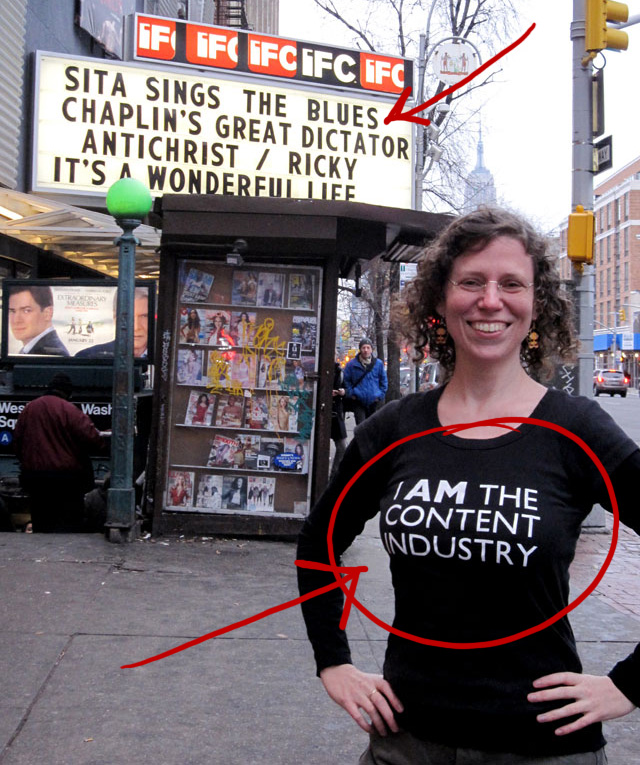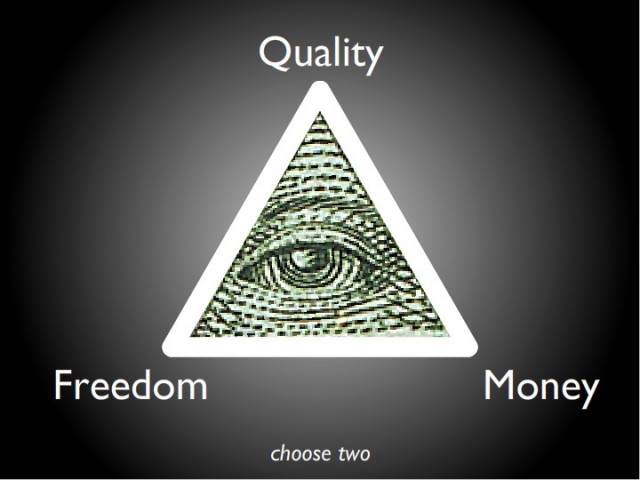“Find out just what people will submit to, and you have found out the exact amount of injustice and wrong which will be imposed upon them; and these will continue until they are resisted with either words or blows, or with both. The limits of tyrants are prescribed by the endurance of those whom they oppress.” — Frederick Douglass, August 4, 1857 (via Terry Hancock)
Category: philosophy
What’s wrong with “streaming” DRM?
Judging from comments here, at Techdirt, and at BoingBoing, there seems to be much confusion about why I don’t want DRM on Sita Sings the Blues. The simplest explanation is this: I am making my film available to all under an open license. Allowing a party to take the benefit of that license, but then limit the rights of downstream users is inconsistent and frustrates the original purpose of the open license — to promote and facilitate access and use of the work.
Some people seem to think DRM is irrelevant on “streaming content.” I was one of them, which is why I was initially so indecisive about the Netflix streaming offer. DRM encourages people to think of certain liberties as being impossible, rather than merely taken away. Already many people think that “streaming” means “cannot be saved on my computer,” instead of “optimized for real-time flow”. People make this false equation entirely because of user-side DRM.
So along with its other problems, DRM is a kind of anti-literacy device for the digital age. The more hobbled people’s phones and computers and music players get, the harder it is to remember what it was like when those devices served their users rather than the monopolists. The more deeply embedded DRM becomes, the more its restrictions will come to feel like “just the way things are”, rather than an impediment that could conceivably be removed or worked around.
I respectfully submit a typical comment:
Its not a download or purchase , its “Free Streaming” . From my Roku box to my tv why should you or I care if it has drm.
This is a perfect example of the kind of illiteracy mentioned above. “…we’re talking about a stream, which by definition is not saved on your computer”. This commenter and others have bought the industry’s definition of “stream”, even though there’s nothing inherent in streaming that prevents saving. I can’t blame them; until last week, I didn’t think about what “streaming” meant either.
Here’s another typical comment:
You’re obviously making a symbolic stand here. That’s fine. But please at least be honest about that instead of claiming that Netflix streaming is “breaking” my home electronics. My computer and my Xbox work just fine and my rights have not been violated in any tangible or meaningful way.
If data is sent to your computer, and yet your computer won’t let you save that data, than an important function of your computer has been interfered with. Who does your computer work for, anyway, you or them? It’s not just a hypothetical breakage, either. For example, if you wanted to divide the same incoming stream to two different computers in your house, similarly to how a “Y” pipe would do with water, Netflix DRM will prevent that. Normally, your computer could do that just fine, but not when it’s broken.
If the quibble is with the word “broken,” we can use the less-inflammatory word “disabled,” although people are eager to forget that “disabling” a computer means “breaking it in increments.”
♦♦♦♦♦♦♦♦♦♦♦
My rejection of DRM is not a condemnation of Netflix (I like Netflix!) nor of those who use this very convenient service. I made this difficult decision as the author of Sita Sings the Blues. The only reason Netflix has DRM on its streams is because of pressure from the “content industry.” Well guess what – I am the content industry too, and I say no to DRM.
Thanks to Karl Fogel for contributing to this article.
The Vegetarian at the Butchers’ Seminar
Yesterday I attended a film conference. I found myself at a talk in which filmmakers were advised how to negotiate deals.
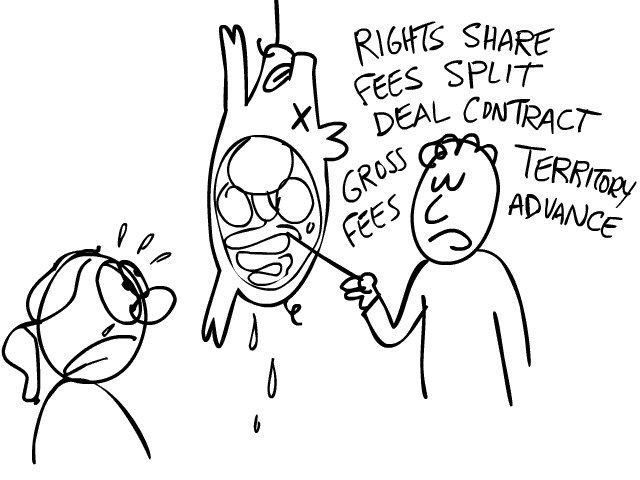
I felt sick listening, and wondered why. Monopolies were an unquestioned, underlying assumption. When the time came for audience comments and questions, I said that rights were monopolies, that monopolies prevent the market from functioning, that distributors can be great if they’re not granted monopolies, and that it’s up to us artists to not grant those monopolies in the first place.
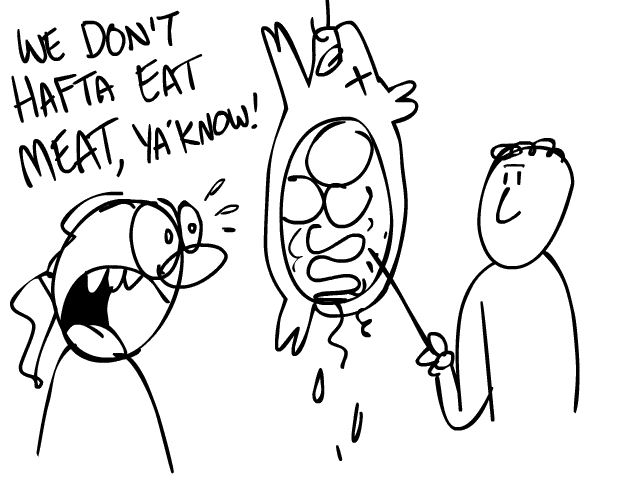
Naturally, the speaker wasn’t too thrilled with my comment.
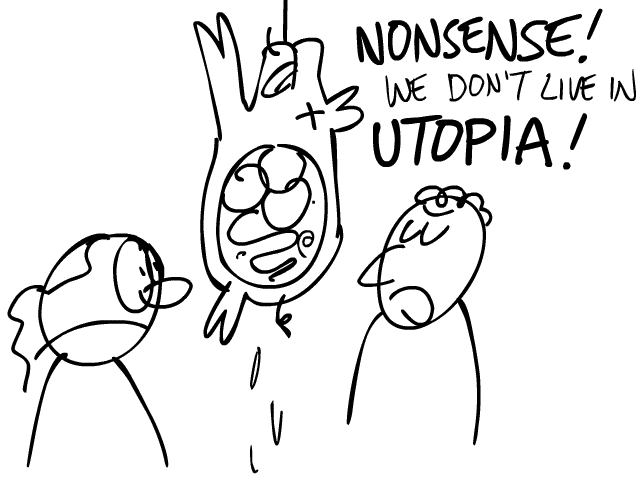
If filmmakers realized monopolies don’t serve them, he’d be out of a job (he’s one of the many professionals who “help” artists by “protecting” them). Later, I came up with a metaphor (or meat-aphor) that helped explain my feelings: being a Free Culture advocate at a film conference is like being a vegetarian at a butchers’ seminar.
As a vegetarian I’ve learned better than to discuss dietary habits with the many carnivores who are my friends and loved ones. So I’m questioning what I’m doing at these conferences. I wouldn’t walk into a butchers’ conference and advocate vegetarianism. But what would I do if I were invited, because some of the butchers wanted to learn about vegetarianism, if only to marvel at its freakishness?
Mimi & Eunice
Many years ago, I thought “Mimi & Eunice” would be a great name for a comic strip. Recently I’ve been needing to do some drawing just to keep my head from exploding, so this week I figured, why not Mimi & Eunice?
As far as I can tell, Mimi & Eunice are two middle-aged children/baby psychos/heterosexual lesbians. That’s all I can surmise so far.  I didn’t put my name on these comics, but I did tag them with the URL mimiandeunice.com. (Unfortunately that site is a mess right now. Webmaster Ian installed the comicpress theme in wordpress, but it’s squishing the strips horizontally unless I make them really tiny. Also, even though it lets me bulk upload media, it doesn’t let me bulk post.
I didn’t put my name on these comics, but I did tag them with the URL mimiandeunice.com. (Unfortunately that site is a mess right now. Webmaster Ian installed the comicpress theme in wordpress, but it’s squishing the strips horizontally unless I make them really tiny. Also, even though it lets me bulk upload media, it doesn’t let me bulk post.
 So I’m just posting a bunch of them here, for now. If anyone out there makes great comics web sites and wants to make one Mimi & Eunice, please get in touch!)
So I’m just posting a bunch of them here, for now. If anyone out there makes great comics web sites and wants to make one Mimi & Eunice, please get in touch!)
 Other than getting mimiandeunice.com functional and pretty, I need to decide which license to release them under, or whether to use a license at all. So far copyleft, as embodied in the Creative Commons Share Alike license, has served my work very well. But maybe I should go for Public Domain instead?
Other than getting mimiandeunice.com functional and pretty, I need to decide which license to release them under, or whether to use a license at all. So far copyleft, as embodied in the Creative Commons Share Alike license, has served my work very well. But maybe I should go for Public Domain instead?
If I use a license, it’ll be one of the 3 Free licenses Creative Commons offers:
CC-BY-SA (copyleft)
CC-BY (attribution)
CC-0 (Public Domain)
The advantage of copyleft is it ensures the work stays Free. Any derivatives must be released under the same terms, so no one can lock it up. It prevents abusive exploitation; no one can monopolize it. The drawback is that keeps it from being used in some projects that use more restrictive licenses. As nasty as restrictive licenses are, they’re still very common, and many worthy projects use them. You can still use a copyleft work within a larger copyrighted work as “Fair Use,” but few are willing to take that risk.
CC-BY (attribution) is compatible with both copyleft and copyright projects, which could conceivably allow the works to spread further. But it still relies on the threat of legal force to ensure attribution. As I wrote recently, attribution has limits that the law might not recognize. Also, I’m intrigued by avoiding legal enforcement as much as possible, and relying on social mores and community ethics to ensure attribution. In fact I already do this with Sita Sings the Blues, but if I want to sue someone for plagiarism or improper attribution, I can. Is that threat really necessary?
Sometimes I think CC-0 (Public Domain) is the most spiritually advanced license. No legal claim to attribution. No legal claim to anything. To put a work in the Public Domain is to totally let it go. That is a turn-on.
Unfortunately many useful Public Domain works are snatched right out of the Public Domain via copyrighted “derivative works”. Take the comic above. If you changed the background color on panel 3 from reddish-gray to lime green, you could say you’ve made a new work and copyright the result. I don’t mind modifications like changing colors, in fact I encourage them; but I abhor monopolies, and the thought of someone then locking up the work in this way is troubling. Certainly the source would remain in the Public Domain. But if someone else modified the source in a similar way, being likewise inspired to change the color of panel 3 to lime green, they could be sued by the jackass that copyrighted his lime-green-panel-3’ed version.
Lewis Carroll’s Alice in Wonderland is in the Public Domain, and technically you can still build on it. But if your “derivative work” too closely resembles Disney’s, they will sue your ass. The laws don’t recognize parallel evolution, nor do the tiny shriveled minds of the corporate executives who wrote them. Thus, although the exact text of Carroll’s original Alice in Wonderland is PD, it’s no longer “free” to build on thanks to corporate monopolies on derivative works.
Much as I want to let go entirely, I fear that could be socially irresponsible. Which also why using no license at all is not really an option. In our world, everything is copyrighted, whether it displays the © symbol or not, whether it’s registered or not, whether it’s attributed or not. Everything is “owned” by someone. Therefore unless something is very clearly marked as Free, it is assumed to be Owned. No license at all would make it impossible for would-be re-users to determine whether the work is legally safe to use.
A friend pointed out that the State gets into everything. Just because I don’t invoke repressive copy restrictions directly, doesn’t mean they don’t affect my work indirectly. Copyright affects everything, whether it’s copyrighted or not. Art is born free, but is everywhere in chains.
Another friend pointed out that my desire to “let go” is still desire. Choosing CC-o/Public Domain to experience the thrill of “selflessness” may actually be more selfish than choosing strong copyleft.
I want my art to stay free. How to achieve that under our current copyright regime, is quite a dilemma.
Quality, Freedom, Money: Choose Two
People seem to want to believe that just freeing works is some magic recipe for success. It isn’t. But since people crave simple business models, I came up with one this morning:
Quality
Freedom
Money
______
Any Two = success
A very good (Quality) film can succeed if it is Free (Freedom) OR has a big promotional budget (Money). A Free film can succeed if it is very good (Quality) or, if it’s not so good, it has lots of paid promotion (Money, because if it’s not good people won’t promote it on their own initiative). A film with lots of Money will succeed if it’s good (Quality) or if it’s Free. Imagine how much further a crap film could go if it’s not only heavily advertised, but Free to share too.
With only one of these properties, a film is unlikely to succeed. If a film is very good but neither Free nor Moneyed, no one will hear about it and it won’t have a chance to become popular. A Free film that sucks won’t go far. A Moneyed film will garner attention only as long as it’s being promoted; once ad spending stops, audience attention goes away.
With all three of these elements, you’ll have a success the likes of which the world has never seen. Moneyed productions have yet to be Free, but maybe someday, for some reason, someone will pour tons of cash into promoting a Free, Quality production. Of course if it fails, that will be due to insufficient Quality, which can’t really be measured and for which no one wants to take responsibility. If someone wants to try this experiment with Sita Sings the Blues, which is already considered “good” and is forever “free,” be my guest!
Given the financial dire straits of the independent film industry, filmmakers should really be looking at Free, because they’re unlikely to have Money. And everyone, always, should be focused on Quality, no matter what business model they prefer. Except Quality is a mystery, and worrying about it does not lead to better Art. But if you happen to luck into some Quality, you know what to do now.

